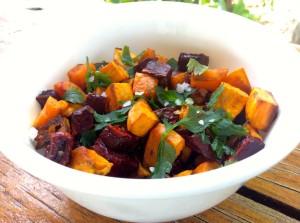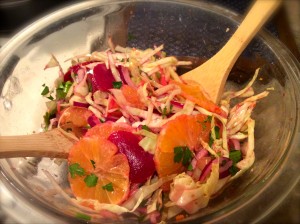Table of Contents
The Quick Answer
Yes, beets are Paleo.
Why Are Beets Paleo?
Beets are Paleo because they are a root vegetable that is loaded with a variety of vitamins and minerals. In fact, beets are known to be a health promoting and disease preventing functional food.
Researchers consider beetroot to be a promising therapeutic treatment in a range of health issues associated with oxidative stress and inflammation; their antioxidants are even considered to have chemo-preventive activity.
Beets are a versatile vegetable that can be prepared in several ways, even eaten raw and added to salads or juices, but watch out for packaged beets that are sold in stores, as they may contain extra sugars and preservatives that do not fall under the Paleo diet guidelines. Instead, experiment with fresh beets at home and experience their impressive health benefits for yourself.
Beets are Nutritious
One cup of beets provides approximately 148 micrograms of folate (that’s 37% of your daily value). Folate (or vitamin B9) is an essential vitamin that’s needed for the body to produce new cells and copy and synthesize DNA.
Folate intake is especially important during pregnancy, as a deficiency increases the risk of neural tube defects and heart complications. Folate consumption is also associated with a lower risk of cardiovascular disease. This is because folate reduces high levels of homocysteine in the blood, a compound that has been linked to heart attacks and strokes. In addition to this, folate can improve brain function and help to relieve symptoms of depression.
Beets are also good sources of manganese (22% DV) and potassium (13% DV). Manganese is needed for many vital bodily functions, including bone development, nutrient absorption and hormone balance. Manganese boosts the immune system and supports respiratory health by reducing inflammation in the body.
Potassium keeps the body hydrated by maintaining fluid and electrolyte balance in the body. Like manganese, potassium increases bone density and protects the cardiovascular system.
Beets are a great source of disease-fighting antioxidants; in fact, beet greens contain high amounts of carotenoid phytonutrients that play a role in protecting the eyes from developing serious conditions like macular degeneration and cataracts.
The beet root also contains these powerful phytonutrients, as does other similarly colored vegetables, like carrots and squash.
Beets get their red color primarily from betalain antioxidant pigments, which are a class of compounds that prevent oxidative stress that contribute to the onset of several degenerative diseases.
The Confusion about Beets Being Paleo
Root vegetables, such as beets, tend to contain higher levels of carbohydrates, which is why their Paleo status can be confusing and even controversial. A cup of beets does contain about 9 grams of sugar, but they are made up of much more than sugar alone.
Because the Paleo diet is focused on consuming foods that are rich in vitamins and minerals in order to fuel the body, beets certainly lie well within those guidelines.
Not only will beets boost energy and even performance levels, they will also protect the body from serious health conditions and diseases.
Paleo-Friendly Ways to Prepare Beets
Beets really double as two vegetables: the roots and the leaves. When preparing the roots, the easiest way is to roast them in a tin foil pouch for 40 minutes at 400 degrees Fahrenheit. When they are cool, wipe away the skins with a paper towel.
Preparing beets yourself will help you to avoid buying prepackaged or jarred beets that have added sugars and preservatives (making them far less paleo friendly).
Once your beets are cooked, add them to salads or mix them with nuts (like sliced almonds) and eat them as a side dish.
Beet greens, believe it or not, can be eaten just like any other leafy green such as spinach, kale or Swiss chard. Chop the greens and stems and sauté them lightly with scallions or leeks for extra flavor.
Beet greens are a great source of fiber, and just like the roots, they are high in antioxidants and essential vitamins and minerals too.
Source:
Clifford, T., Howatson, G., West, D. J., & Stevenson, E. J. (2015). The Potential Benefits of Red Beetroot Supplementation in Health and Disease. Nutrients, 7(4), 2801–2822. http://doi.org/10.3390/nu7042801
Download Your FREE Paleo Starter Kit Today!
- 3-Day Paleo Diet Meal Plan
- Comprehensive Paleo Diet Shopping List
- 5 of Our Favorite Paleo Diet Recipes


